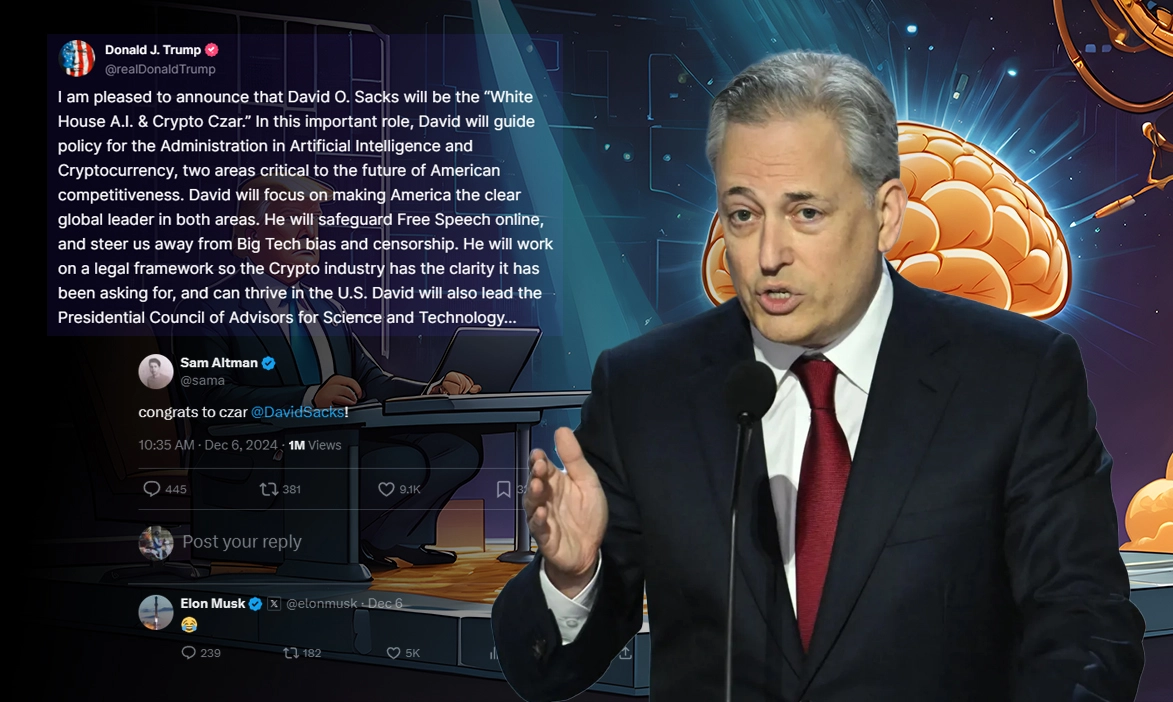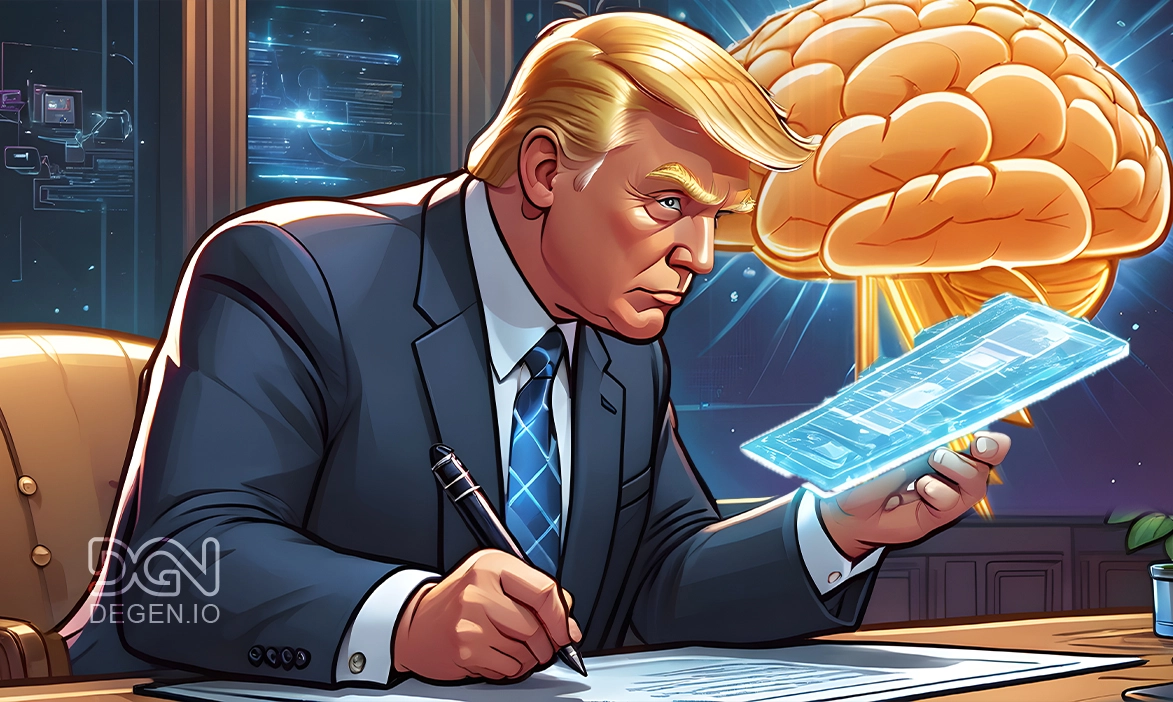United States President-elect Donald Trump has announced the appointment of David Sacks as his presumptive White House Crypto and AI Czar, setting the stage for a transformative approach to cryptocurrency and artificial intelligence (AI) policy.
Sacks, a former PayPal executive and member of the renowned “PayPal Mafia,” brings extensive experience in the tech sector and a deep understanding of blockchain and AI technologies. However, his appointment has also reignited debates about OpenAI’s controversial pivot to a “for-profit” model, a move he has criticized as a betrayal of its founding mission.
Sacks’ Appointment and His Vision for AI and Crypto

Trump announced Sacks’ role on Dec. 5 via Truth Social, signaling a clear commitment to reshaping U.S. policy in the rapidly evolving tech landscape. Known for his advocacy of decentralized systems, Sacks has championed the use of open-source AI and voiced strong opposition to government overreach in regulating emerging technologies.
His reputation as a crypto enthusiast, particularly as a supporter of blockchain projects like Solana, has sparked optimism within the cryptocurrency community. Sacks has consistently pushed for regulatory frameworks that balance innovation with consumer protection, a perspective welcomed by many stakeholders.
In the AI sector, his preference for industry self-regulation and open-source solutions could steer the U.S. away from heavy-handed government controls, fostering a competitive and innovative environment.
Sacks vs. OpenAI: The Roots of the Controversy
While Sacks’ appointment has been met with praise in crypto circles, his critique of OpenAI’s restructuring has drawn attention. In an October episode of the popular All-In podcast, Sacks, alongside tech billionaire Mark Cuban, lambasted OpenAI for its shift to a for-profit model.
OpenAI, co-founded by Elon Musk in 2015 as a nonprofit research organization, pivoted to a hybrid structure in 2019. The company established a “capped-profit” model, which it claims allows it to scale operations while funding its nonprofit research. However, critics like Sacks argue that this shift undermines the philanthropic intent that initially attracted investors like Musk, who contributed $50 million during its early days.
Sacks described OpenAI’s transformation as a betrayal, calling the organization a “piranha, for-profit company.” Cuban echoed this sentiment, stating, “When people f— over investors, it always comes back. Karma is a b—- in business, too.”
Musk’s Lawsuit Against OpenAI
Elon Musk, who now runs a competing AI venture called xAI, has taken his grievances with OpenAI to court. On Dec. 2, Musk’s legal team filed a motion in California seeking to block OpenAI’s for-profit pivot. Musk claims the restructuring unfairly limits competition and misrepresents the original nonprofit vision he supported.
This legal battle adds a layer of complexity to Sacks’ new role. With strong ties to Musk and a shared skepticism of OpenAI’s direction, Sacks’ influence on federal AI policy could impact the broader industry, particularly in relation to open-source AI solutions.
Crypto Community Reacts to Sacks’ Appointment
Sacks’ appointment has generally been well-received by the cryptocurrency community. As an advocate for multi-coin investments and decentralized platforms, he aligns with many of the industry’s core principles.
His critical stance on government overreach resonates with crypto proponents wary of overregulation. Notably, Sacks has emphasized the importance of fostering innovation while maintaining safeguards to protect consumers from fraud and financial exploitation.
Ryan Selkis, former CEO of the Messari cryptocurrency exchange, reacted to Sacks’ appointment with a mix of sarcasm and optimism, stating, “This makes me so happy,” alongside a meme that quickly went viral within crypto circles.
Sam Altman Congratulates Sacks, Musk Responds
In a surprising twist, OpenAI CEO Sam Altman publicly congratulated Sacks on his new role. Altman’s post on X (formerly Twitter) praised Sacks’ expertise, describing his appointment as a “win for innovation.”
However, Musk’s response to Altman’s post was less cordial. The Tesla and xAI founder replied with a laughing emoji, signaling his ongoing dissatisfaction with OpenAI’s leadership and direction.
The exchange highlights the growing tensions among tech leaders as they navigate the intersection of AI innovation, ethics, and business practices.
What Sacks’ Role Means for U.S. Policy
As Crypto and AI Czar, Sacks will likely shape policy in two critical areas:
- Cryptocurrency: His support for decentralized platforms and open financial systems suggests a push for regulatory clarity that encourages blockchain innovation while addressing security concerns.
- Artificial Intelligence: Sacks’ preference for open-source AI and skepticism of centralized control could lead to policies that empower private-sector development and reduce bureaucratic interference.
However, balancing these goals with national security and ethical considerations will be a significant challenge.
Implications for the Future
Sacks’ appointment comes at a pivotal moment for both the crypto and AI industries. With rising global competition in AI and increasing scrutiny of cryptocurrencies, his leadership could define the U.S. approach for years to come.
Supporters argue that his expertise and innovative mindset position him to address the complexities of these technologies effectively. Critics, however, caution that his ties to Musk and sharp criticisms of rivals like OpenAI could create conflicts of interest.
As the U.S. prepares for a new administration under Trump, all eyes will be on Sacks to see how his vision translates into actionable policies. For now, his appointment signals a bold step toward embracing the transformative potential of crypto and AI while navigating the challenges they bring.
